Podcasting to engage with international PGT students: The Plagiarism Podcast
Antonio Rodriguez-Gil*
and Jennie Robinson
Leeds University Business School, University of Leeds
*Corresponding Author: a.rodriguezgil@leeds.ac.uk
Published July 2025
1. Introduction
The abrupt eruption of online assessment and GenAI since 2020 have raised concerns about the impact that these developments could have on Academic Misconduct [AM] offences in HE — plagiarism in lay language. We know that during the pandemic, when online assessment was widely implemented in HE, plagiarism grew (Thomas et al., 2022, Ives and Cazan, 2023). We also know that postgraduate taught (PGT) students, who tend to be international, generally receive less training prior to arriving to the University of Leeds (UK), which translates to a higher offence rate, i.e. there is a greater share of PGT students that have coursework flagged as potentially falling short of AM standards.
As Academic Integrity reps, it was clear to us that the answer to these challenges was better Academic Integrity Literacy, understood as a set of academic skills and values that need to be upheld over time (Eaton, 2019, 2021). Our intervention consisted in creating a podcast on plagiarism. The aim was to provide tools for all students (though especially PGT) to engage, refresh and remind themselves of the AM procedures with short, audio-visual vignettes which will augment written and lecture-based resources. The rationale being that different students access and engage resources in different ways, hence we hoped that providing information on diverse media would help engage with a diverse student body, as recognised by the Universal Design Learning literature approach (Levey, 2023). Podcasting, in particular, has been shown to improve engagement and enable personalising of the student experience (Errabo et al., 2024, Besser et al., 2022) and was under-utilised in our institution.
In the following, we report what we have learnt from the introduction of our podcast in 2023/24, and what we do not know yet. In a nutshell, we know that there is strong demand for the podcast, particularly among PGT students, although so far, we only have anecdotal evidence on offence rates.
2. Podcast overview
In 2023/24, we created a series of four videos, covering the most common AM offences that we observed in our institution, namely, self-plagiarism, collusion, using detection websites, and mistakes referencing in online exams. In 2024/25 we added another three videos: a general introduction to plagiarism, another one on inappropriate use of GenAI, and GenAI and the dissertation (for economists only). The format is video recorded on-screen with voice-over. This means students can listen to audio only (e.g., whilst walking home) but have the option to watch along on-screen (listening whilst reading subtitles, which is a popular format for students working in second language).
Video durations are short: typically 5 to 10 minutes. Each video includes a brief introduction in plain language to why, say, self-plagiarism or collusion are considered an AM offence. We follow with an example of the Turnitin report of a real case where the said offence was found. This serves two purposes: first, to introduce students to what the software does. It is well-known that showing students a Turnitin report can be useful to prevent offences. Second, it helps show how we can pick up offences. We then go back to the regulation to present a more formal explanation of the offence, and a “Take home” message, with recommendations of how to avoid malpractice. Each video also has a QR code linking to further resources.
Figure 1. Structure of a podcast episode (click to expand)
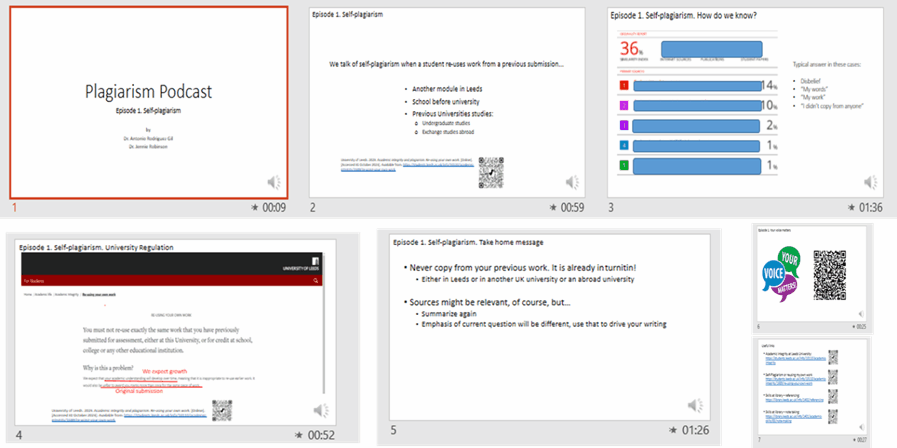
3. Assessment of the intervention
The podcast was first made available to students in Economics as a pilot in 2023/24[1]. This means that we now have data for a full year from the pilot, and hence it is reasonable to ask what we have learnt. The size of the student cohort to which the podcast was made available in 2023/24, i.e. Economics students, was above 900 students, including UG and PGT. The composition of these two groups in Economics is similar to that of other Business School programmes. UG is dominated by domestic students, while PGT groups are predominantly dominated by international students. We can then use the UG-PGT split as a proxy for domestic-international students, and see if there are differences in how these two groups of students use the podcast. As noted above, this is a very pertinent split, as PGT students show a far greater offence rate than UG.
Data from Mediasite tell us what videos students are watching, how many, for how long, and when. Although it does not seem a lot at first, it turns out to be very informative. As shown in Figure 1a, the share of economics students that watched at least one of the podcast episodes was 15%. However, this proportion is substantially larger for PGT, as more than 40% of them watched at least one episode. In terms of topics, there are no significant differences; UG and PGT students seem interested in the same topics/episodes. As Figure 2b shows, the most popular episode for UG students was the one dedicated to self-plagiarism, followed by the episode on detection websites and referencing in online exams. PGT students showed similar interests.
Where we find differences is in the number of videos, as well as the time students spent on the videos. As Figure 2d shows, PGT students watched for longer, 45% of the video duration, compared to 37% duration for UG students. PGT students also watched more videos than UG students on average. As Figure 2c shows, PGT watched 1.85 videos versus 1.5 for UG students.
Figure 2. Who, what, how many, and for how long
(a)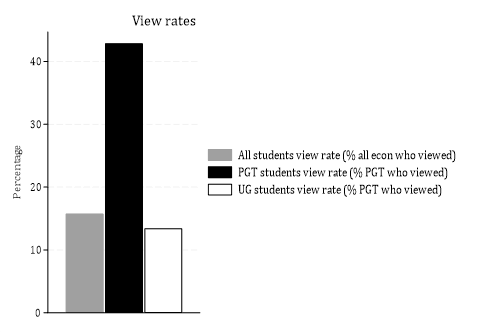
(b)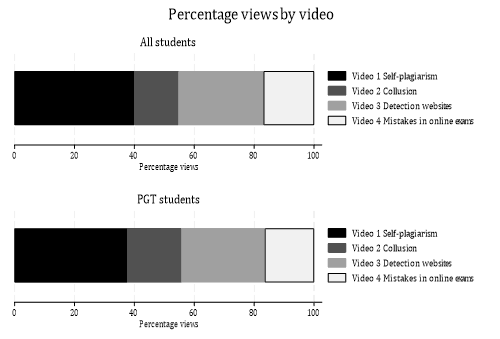
(c)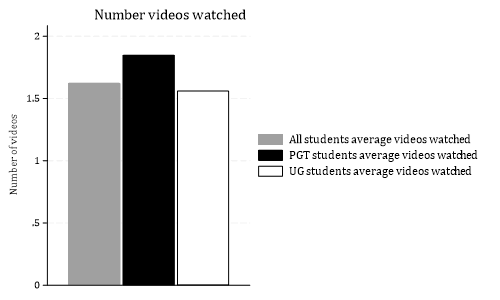
(d)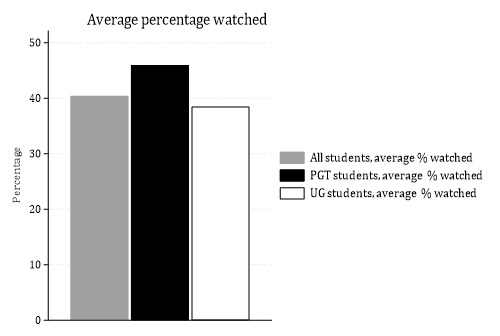
Mediasite also gives us a time profile of views; see Figure 3. These profiles are useful to understand when students are watching. As shown in Figure 3, views for all videos peaked up in 2023 before Christmas; this is when videos were first advertised to students (during module leaders' assessment guide sessions, messages on the virtual learning site, and module list email). They have a second, but minor, peak during the exam window in January, or April-March, when students were again reminded of videos, although this second peak is a lot smaller. So the first lesson is that students respond to advertising through mailing, although respond more the first time than the second one, probably as the novelty dies out.
Another unexpected positive outcome of the pilot in Economics came from staff comments. The podcast was designed with students in mind, but several colleagues praised the initiative because they found it was also useful for them to improve their own Academic Misconduct literacy.
Figure 3. Episodes' time profiles
(a) Self-plagiarism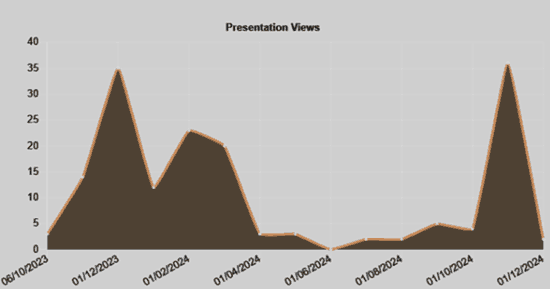
(b) Collusion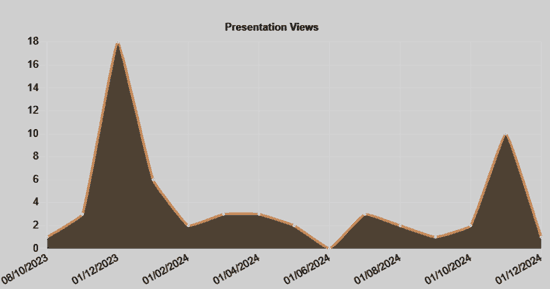
(c) Detection websites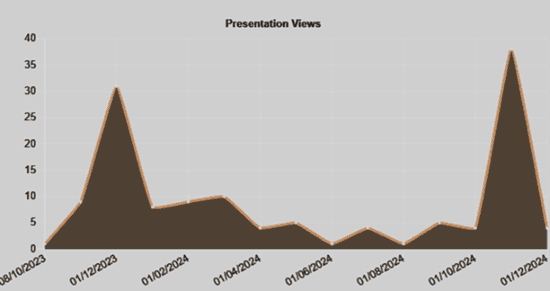
(d) Referencing during online exams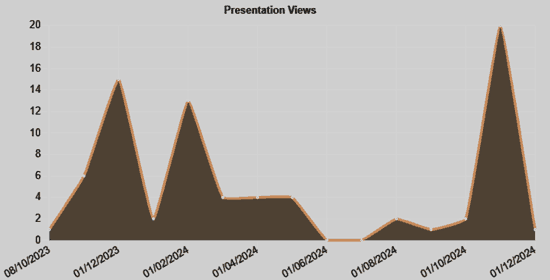
4. Summary
In response to the challenges that online exams and GenAI pose to the sector in terms of Academic Misconduct, we have created a tool to complement standard AM training, namely, a podcast series dedicated to plagiarism.
In assessing the intervention, we find that there is strong demand for the podcast, particularly among PGT students. This is shown by larger view rate, time watched, and number of videos watched. Thus, we conclude that the podcast is a very effective tool to improve engagement with PGT students, who tend to be international students. This is an encouraging result, considering that PGT students suffer a greater offence rate. It was positive to observe that, during 2023/24, the gap was reduced substantially. Data for more years would be needed, and a purposeful study would be needed to establish causality.
In sum, the podcast has proven to be a good tool to improve engagement with international PGT students, who show a strong demand for the podcast. The podcast has received praised by colleagues and it has coincided with a reduction in the offence rate gap between UG and PGT students.
Notes
[1] In 2024/25 the podcast was made available to more students in our school, but we do not have data for this year yet.
References
Besser, E.D., Blackwell, L.E. and Saenz, M. (2022). Engaging students through educational podcasting: Three stories of implementation. Technology, knowledge and Learning, 27(3), pp.749-764. https://doi.org/10.1007/s10758-021-09503-8
Eaton S.E. (2019). Exploring the notion of academic integrity literacy. Learning, Teaching and Leadership: A Blog for Educators, Researchers and Other Thinkers. https://drsaraheaton.wordpress.com/2019/03/16/exploring-the-notion-of-academic-integrity-literacy/.
Eaton S.E. (2021). Academic integrity and literacy. In: Hunt L, Chalmers D (Eds.), University Teaching in Focus. Routledge. pp 163–178. https://doi.org/10.4324/9781003008330-9, https://www.taylorfrancis.com/chapters/edit/10.4324/9781003008330-9/academic-integrity-literacy-sarah-elaine-eaton
Errabo, D., Dela Rosa, A. and Gonzalez L.J.M. (2024). "Optimizing differentiated podcasts to promote students’ self-regulation and engagement, self-efficacy and performance in asynchronous learning", Journal of Research in Innovative Teaching & Learning, Vol. 17 No. 2, pp. 368-390. https://doi.org/10.1108/JRIT-02-2024-0039
Ives B., Cazan A.M. (2023). Did the COVID-19 pandemic lead to an increase in academic misconduct in higher education? Higher Education. Jan 21:1-19. https://doi.org/10.1007/s10734-023-00996-z
Levey, S. (2021). Universal Design for Learning. Journal of Education, 203(2), 479-487. https://doi.org/10.1177/00220574211031954 (Original work published 2023)
Thomas, M., Dubre V., Elliott K., Escareno J., Fagan M.H., Standridge E., and Lieneck C. (2022). "COVID-19 Academic Integrity Violations and Trends: A Rapid Review" Education Sciences 12, no. 12: 901. https://doi.org/10.3390/educsci12120901
UoL (2023) Plagiarism Podcast. https://business.leeds.ac.uk/dir-record/research-projects/2225/plagiarism-podcast [Last accessed 9th of July 2025]
Stoesz, B.M., Yudintseva, A. (2018). Effectiveness of tutorials for promoting educational integrity: a synthesis paper. International Journal for Educational Integrity 14, 6 https://doi.org/10.1007/s40979-018-0030-0
↑ Top
